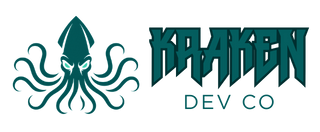
What if the only thing standing between you and a career in tech… is a myth?
You’ve heard it. Maybe from a teacher, a recruiter, or even a well-meaning friend: “You need a computer science degree to work in web development.”
Let’s be blunt—2025 has buried that narrative.
If you’ve got the skills and the drive, you can break into web development with zero university debt, no formal qualifications, and a GitHub account full of real code. At Kraken Dev Co, we don’t care where you learned—only what you can build.
Here’s how to make it happen.
What Is Web Development?
Web development is the engine behind the internet. It’s how websites, applications, dashboards, and portals are designed, built, and maintained.
The field splits into three primary roles:
Front-End Development
Front-end developers handle what users see and touch. Think layouts, buttons, menus, and animations. Core technologies include:
- HTML – the structure
- CSS – the styling
- JavaScript – the interactivity
You’ll also encounter frameworks like React, Vue.js, and Bootstrap. Front-end is ideal if you like blending logic with visuals.
Average Salary (US): $73,825
Back-End Development
Back-end developers work on what users don’t see—servers, databases, and the logic powering features.
Key tools:
- Node.js, Python, PHP, Ruby
- SQL/NoSQL databases
- Authentication, APIs, and cloud integrations
Average Salary (US): $76,877
Full-Stack Development
Full-stack developers do both. You’ll be building entire systems end to end. It’s a challenge—but it offers flexibility and better autonomy.
Average Salary (US): $76,424
Do You Need a Degree to Become a Web Developer?
No. The best part of web development is that it rewards ability, not credentials.
The industry has shifted towards a skills-first model. Hiring managers want portfolios, GitHub activity, and real-world problem-solving—not diplomas. In fact:
- 13% of developers are entirely self-taught
- 70% use self-study or non-degree pathways
(Source: Stack Overflow Developer Survey 2025)
Major tech firms, lean start-ups, and even government orgs now evaluate candidates based on what they can deliver—not where they studied.
Do Web Development Certificates Help?
Yes—but only if they’re practical, current, and project-based.
A good certificate programme should include:
- Core languages (HTML, CSS, JavaScript)
- Version control (Git, GitHub)
- Frameworks (React, Django, etc.)
- API integration
- Portfolio-ready projects
Look for respected platforms like Coursera, Udemy, and Scrimba. According to Foote Partners, one certificate alone can increase your salary by over 7%.
Step-by-Step: How to Become a Web Developer Without a Degree
1. Learn the Core Technologies
Your foundation:
- HTML and CSS: Structure and styling
- JavaScript: Functionality and interactivity
Start here:
2. Take Structured Courses
Online courses offer direction. Look for ones that:
- Include portfolio projects
- Teach in-demand frameworks
- Offer community or mentor support
Strong picks:
- Web Design for Everybody (University of Michigan, Coursera)
- The Complete 2025 Web Development Bootcamp (Angela Yu, Udemy)
3. Build Projects From Day One
Code without projects is just theory. Build things like:
- Personal portfolios
- Clone apps (e.g., Spotify, Airbnb)
- Interactive tools (to-do lists, calculators, weather apps)
Host on GitHub Pages, Netlify, or Vercel. Make your work public and reviewable.
4. Master the Core Skills
Technical Stack:
- HTML, CSS, JavaScript
- React, Node.js, Bootstrap, Django
- Git and GitHub
- Chrome DevTools, unit testing
- Mobile-first responsive design
- Accessibility standards (WCAG)
Workplace Skills:
- Clear communication
- Design thinking
- Debugging and problem-solving
- Collaboration
- Continuous upskilling
5. Build a Killer Portfolio
A polished portfolio is your passport.
Include:
- 3–5 working projects
- Live demo links
- GitHub repos
- Write-ups detailing tech stacks, features, and challenges overcome
Pro tip: Blog about your process to show thinking, not just output.
6. Earn a Certificate (Optional)
Certifications aren’t mandatory—but they can validate your knowledge.
Look into:
- Meta Front-End Developer (Coursera)
- IBM Back-End Developer (Coursera)
- University of Michigan’s Web Design for Everybody
Pair these with your portfolio for maximum impact.
7. Get Real-World Experience
You don’t need permission to start building.
Ways to build credibility:
- Freelance: Sites like Upwork, Fiverr, or work with local businesses
- Intern: Many companies hire trainees without degrees
- Open Source: Contribute to GitHub projects
- Hackathons: Join short-term coding sprints to simulate real work
8. Network Smart
The tech world is interconnected. Use it.
- Engage on Twitter and LinkedIn
- Join Discord servers and dev Slack groups
- Participate in meetups, forums, and online bootcamps
- Reach out to developers for advice or code reviews
9. Write a Targeted CV
Tailor every application. Showcase:
- Technical skills and tools
- Projects (with links)
- Transferable soft skills
- Keywords from job descriptions
What Jobs Can You Get Without a Degree?
Here’s where many start:
- Junior Web Developer
- Front-End Developer
- Back-End Developer
- WordPress Developer
- UI/UX Developer
With more experience, you can move into roles like:
- Computer Programmer – $89,102
- Database Administrator – $89,747
- Information Security Analyst – $110,659
- Information Systems Manager – $120,547
(All salaries from Glassdoor, May 2025)
Real Success Stories
Mark Tiddy – Youth Worker to Web Dev
Mark, a 34-year-old from the UK, began with Udemy courses and joined CareerFoundry. He freelanced, built in public, and landed an agency role. He now mentors junior devs.
Lesson: Build, share, repeat. Rejections aren’t failures—they’re fuel.
Travis Rodgers – Receptionist to DevOps
Travis started blogging with HTML, dropped out of a bootcamp, but kept building. He freelanced with WordPress, contributed to open source, and now works in DevOps.
His advice: Stick to one path. Don’t chase every tutorial. Focus on real projects.
How Long Does It Take?
Full-time learner: 4–6 months
Part-time learner: 8–12 months
Getting your first role depends on:
- Project quality
- Networking
- Application volume
- Your ability to ship code
Final Thoughts
The web doesn’t care about degrees. Neither do we.
What matters is that you build. Show up. Ship. Repeat.
Kraken Dev Co hires based on code, not credentials. Whether you’re self-taught, bootcamp-trained, or switching careers, there’s a place for you—if you’re willing to put in the reps.
Start now. One project. One repo. One win at a time.



